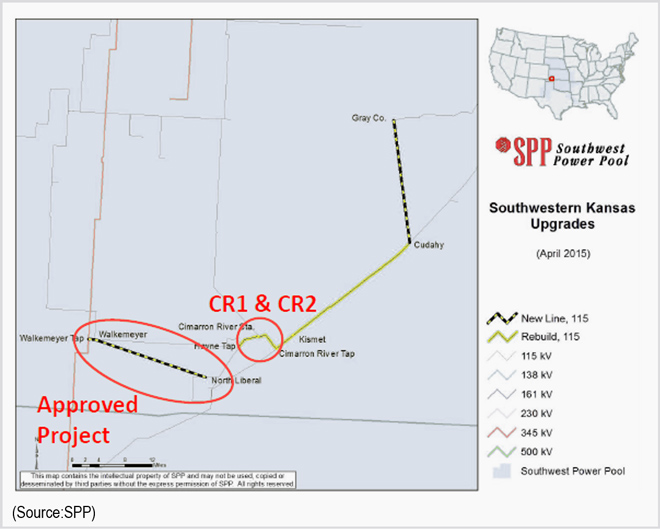By Rich Heidorn Jr.
TULSA, Okla. — SPP staff’s recommendation that the RTO approve a 21-mile 115-kV line from Walkemeyer to North Liberal as part of a reliability solution in southwestern Kansas failed to win stakeholder endorsement last week.
Staff’s solution received almost 64% support from the Markets & Operations Policy Committee, falling short of the two-thirds needed to recommend it to the SPP board.
Staff considered three alternatives, two of which would have delayed the line indefinitely, instead relying on operating guides for Sunflower Electric Power’s 76-MW Cimarron River Station to provide relief from thermal or voltage violations.
Option 1 would add a new substation with a 345/115-kV transformer on the Hitchland–Finney 345-kV line and a new 1-mile 115 kV line from the substation to Walkemeyer at an estimated cost of $17.8 million. Cimarron would be dispatched for up to 58 MW when needed to avoid violations.
Staff’s suggestion, option 2, included the new substation and transformer but would add the Walkemeyer-North Liberal line for an additional $17.5 million, avoiding the need to rely on Cimarron for reliability.
Although option 2 had higher upfront costs, staff said it was about $1.4 million cheaper than option 1 on a net present value basis over 20 years ($68.9 million vs. $67.5 million).
Option 3, which would have relied solely on the Cimarron plant, had an NPV of $84 million and only “marginally” solved voltage violations, staff said.
Tom Hesterman of Sunflower said option 1 was the best choice, being a “statistical tie” with option 2 in NPV and having lower upfront costs.
Brian Gedrich of NextEra supported the 21-mile addition, saying “it could be the only competitive project” SPP approves in the current planning cycle.
The Cimarron plant has two natural gas-fired units: a 61-MW unit built in 1963 and a simple-cycle 15.5-MW combustion turbine added in 1967.
American Electric Power’s Richard Ross was skeptical of reliance on the aging plant, saying Sunflower was not obligated to keep it running if it requires costly repairs. He said he feared the unit could fail, necessitating the Walkemeyer-North Liberal project — but without the lead time necessary to open it to competitive bidding.
Sunflower’s Al Tamimi said the company invested heavily in the unit — adding a new cooling tower in 2014 — and had no plans to retire it. Southwestern Public Service’s phase shifter can maintain system reliability if the Cimarron plant is unavailable, Tamimi added.
“I just don’t think it’s appropriate for us to continue to rely on a unit we can’t rely on,” Ross insisted.
“That’s your opinion,” Tamimi responded. “You don’t know anything about the unit.”
“I do know that if the unit fails tomorrow and you don’t return it to service that … you’re going to turn around next year and put it right in the model as unavailable and the project … that we’re talking about here” will be required, Ross fired back. “And the difference will be whether or not you’ve pushed things out to where it’s not a competitive project.”
Antoine Lucas, director of planning, said staff would consider stakeholders’ comments before making its recommendation to the board.




